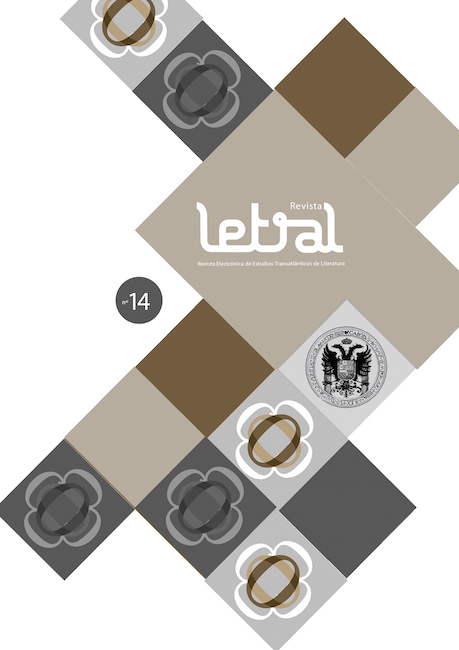La legitimidad del entusiasta: dos hipótesis históricas
DOI:
https://doi.org/10.30827/rl.v0i14.3799Palabras clave:
Retórica Entusiasta, Secularización, Klopstock, Filosofía De La HistoriaResumen
Las siguientes líneas se proponen poner a prueba las siguientes hipótesis: fue la propia cultura literaria –y, de manera paradigmática, la “poesía sagrada” de Klosptock– aquella que hizo accesibles a un público consumidor de textos literarios un nuevo tipo de auto-comprensión histórica. Las poéticas entusiastas del siglo XVIII contribuyeron así a legitimar una imagen profética de la subjetividad, estrechamente asociada a los ideales de emancipación y progreso universal. Nuestra tarea consistirá entonces en reconstruir los rasgos principales de ese proceso, a partir de algunos aspectos programáticos enunciados por la poética de Friedrich G. Klopstock (1724-1803) y otros autores a él contemporáneos.Descargas
Citas
Aner, Karl (1929). Die Theologie der Lessingzeit. Halle/Saale: M. Niemeyer.
Blumenberg, Hans (1995). Naufragio con espectador. Madrid: Visor.
Clark, Jonathan P. (1990). “Beyond Rhyme or Reason. Fanaticism and the Transference of Interpretive Paradigms fromthe Seventeenth-Century Orthodoxy to the Aesthetics of Enlightenment”, en Modern Language Notes, Vol. 105, n.º 3. 563-582.
Gottsched, Johann C. (1983), “Was von den christilichen Epopeen zu halten sey?” [1752], en Walther Killy (ed.), 18. Jahrhundert. Texte und Zeugnisse. Die deutsche Literatur, T. IV/2. München: C.H. Beck´sche Verlagshandlung.
Joachim, Jacob (1997). Heilige Poesie. Zu einem literarischen Modell bei Pyra, Klopstock und Lange. Tübingen: Max Niemeyer Verlag.
Kaiser, Gerhard (1963). Klopstock. Dichtung und Religion. Guterslöh: Gütersloher Verlagshaus Gerd Mohn.
Kant, Immanuel (2004). El conflicto de las facultades. Buenos Aires: Losada. Kemper, Hans-George (1997). Deutsche Lyrik der frühen Neuzeit. T. 6/1 Empfindsamkeit, Tübingen, Niemeyer.
Koselleck, Reinhart (1979). Vergangene Zukunft. Zur Semantik geschichtlicher Zeiten. Suhrkamp: Frankfurt am Main.
Klopstock, Friedrich Gottlieb (1962). Ausgewählte Werke. München.
Martens, Wolfgang (1968). Die Botschaft der Tugend: Die Aufklärung im Spiegel der deutschen Moralischen Wochenschriften. Stuttgart: Metzler.
Ulshöfer, Robert (1956). “Friedrich Klopstock: ‘Die Frühlingsfeier’”, en Die deutsche Lyrik. Form und Geschichte. Interpretationen. Vom Mittelalter bis zur Frühromantik. Düsseldorf: August Bagel Verlag.
Voegelin, Eric (2006). La nueva ciencia de la política: una introducción. Buenos Aires: Katz.
Vöhler, Martin (1997). ‘Danken möcht’ ich, aber wofür?’ Zur Traditionund Komposition von Hölderlins Hymnik. München: Fink.
Descargas
Publicado
Cómo citar
Número
Sección
Licencia
Revista Letral es una publicación de acceso abierto e inmediato totalmente gratuita, tanto para quien lee como para quien publica. Los autores y las autoras no pagan ningún tipo de tasa por el proceso editorial de sus artículos. Permitimos la lectura, descarga, copia, distribución, impresión, búsqueda, enlace o reutilización con fines no comerciales de todos los trabajos publicados, siempre que se citen la autoría, la revista y el órgano editor. Recomendamos encarecidamente la difusión de los artículos en redes sociales (Facebook, Twitter, LinkedIn, etc.) y científicas (ResearchGate, Academia.edu, etc.), repositorios institucionales universitarios y otros repositorios públicos, blogs y webs personales o institucionales, Google Scholar, ORCID, ResearchID, ScopusID, etc. En cualquier caso, la propiedad intelectual de los artículos y los posibles derechos económicos derivados de ellos son exclusivamente de sus autores.














